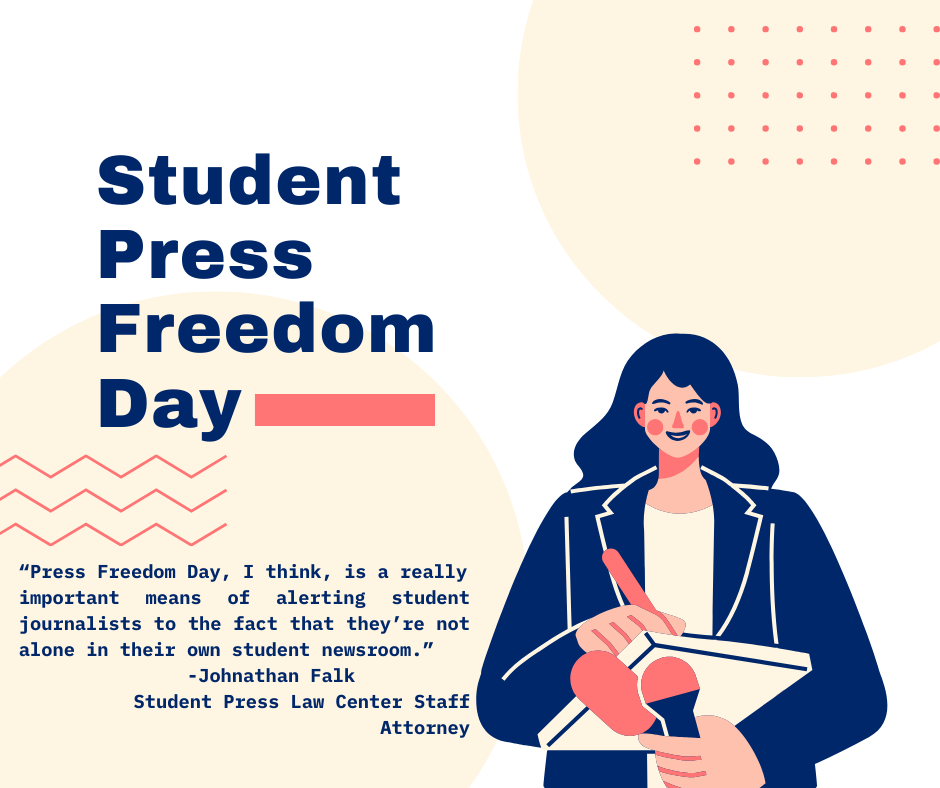Students who publish their writing are protected under the First Amendment. Student Press Freedom Day is a time to celebrate and support the rights of high school and college journalists.
“To me, I think it’s important that even as a student journalist, you can report on whatever you have to and feel like you can report on it in the best way possible. I would say it is important,” said WSIU Reporter and journalism student Ethan Holder.
The date of Student Press Freedom Day was chosen as Feb. 22 because of the Tinker v. Des Moines Supreme Court case. The Student Press Law Center wanted to align the holiday with the case decision. It was the first time it was acknowledged that students have rights under the First Amendment in schools.
Advertisement
“The day of the Tinker decision, Tinker versus Des Moines, was really our first major Supreme Court case that indicated that students had any rights in school at all under the First Amendment. So certainly a date worth celebrating. We really appreciate the fact that people come out and write a report on it or educate each other which is really important,” said Student Press Law Center Staff Attorney Johnathan Falk.
This holiday was founded five years ago to show support for students in journalism. The Student Law Press Center was founded in 1974 to support and defend student journalists’ and advisers’ rights to their publications under the First Amendment. The center encourages students to publish their work even if it could cause controversial reactions because students are protected.
“You know, student journalists, wonder, well, is it worth the fight? Is it worth putting our voice out there? If we’re going to have to appeal to what my principal says, we typically think yes, that’s why it’s important for you to fight so that you have that precedent to look back on and say, we’ve done the fighting for this article we wanted to publish that might be considered controversial,” Falk said.
The Student Law Press Center has been active for 50 years and has offered student journalists services since the beginning. The center runs a free legal hotline that is open 24 hours for anyone who has questions about legal, publishing and copyright questions. It has guest speakers to inform students about their rights and have a program named New Voices that travels from state to state fighting for student journalists.
“Our hotline is a big resource and one that we’re really proud of. Any sort of legal issue that comes up in the course of doing that student journalism, learning about the process, and actually publishing,” Falk said.
In Illinois, there is a statute that states student journalists have the right to exercise freedom of speech and freedom of the press in school-sponsored media. Students are allowed to publish what they write as long as it is not libelous, it is law abiding, does not invade privacy and does not disrupt the operation of the school.
“Illinois is one of the states where students have much broader rights. At a conference, I asked the student journalists what their experiences are like and a lot of them still have the principals censoring what they write about. So even though it’s illegal to censor a student’s writing, it still happens from time to time, even in Illinois where there’s a statute,” said SIU journalism professor William Freivogel.
Advertisement*
Student journalists can be unsure if what they are writing should be censored. The Student Law Press Center wants to make students aware that there is a community for students to turn to when they approach questions about censorship. Due to external factors, some students self-censor their writing so they don’t face repercussions or negative feedback.
“So press freedom day, I think, is a really important means of alerting student journalists to the fact that they’re not alone in their own student newsroom. There is a community of people on a nationwide level, who are undergoing similar questions and encountering similar questions in their publication as to whether they’re censored or whether they are self censoring,” Falk said.
Students at SIU know that it’s important to have protection while learning about journalism and beginning to publish their writing. During this transitional period, students strive to create objective pieces that will prepare them for their future in journalism.
“If you’re writing articles, you gain experience, whether you go into the workforce, whether it’s just in class or on the job, you need to do it in as true of a sense as possible. So when you go into the workforce, you’re not doing something completely different from the way you were doing in school,” Holder said.
Staff reporter Alli Goering can be reached at agoering@dailyegyptian.com
Advertisement

















